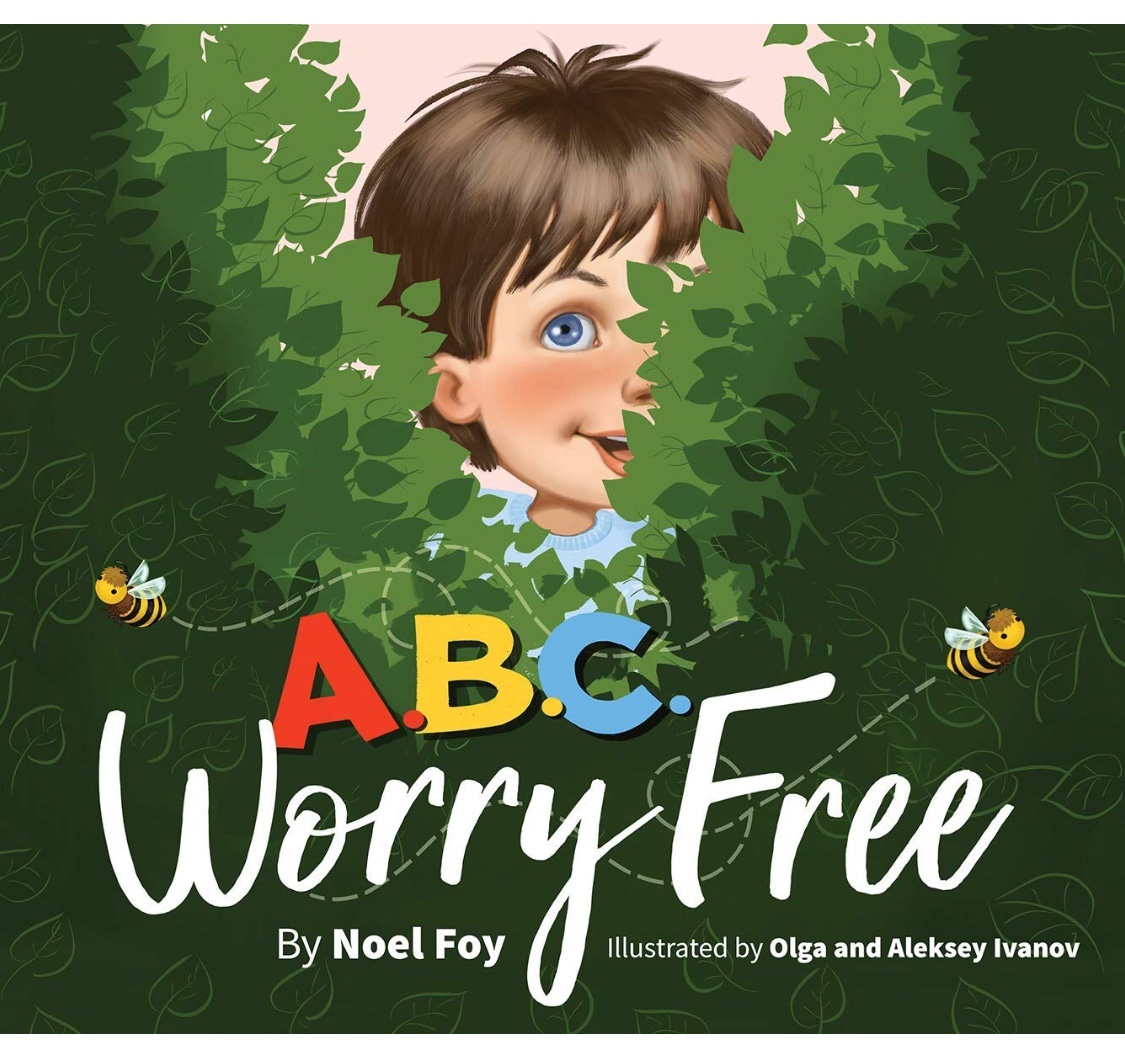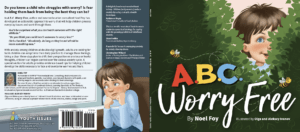Stress: Toxic to the Brain and Learning Literacy Skills by Noel Foy

This month’s blog post was written Noel Foy, one of our Keys to Literacy trainers who is an expert on learning and the brain and who has just published a children’s book about anxiety titled “ABC Worry Free”. In her post, Noel discusses how stress affects learning.
Stress is a topic typically associated with adults, but with the increase in anxiety disorders among children over the last ten years, its impact on their ability to learn literacy skills is worrisome. Neuroscience research reveals the brain can experience stress as feelings of anxiety, anger, frustration, boredom or lack of personal relevance. Unfortunately, many students in classrooms across the country find themselves in at least one of these negative states on a chronic basis, causing the amygdala, the brain’s personal watchdog for potential threats, to activate the stress response.
Why is this a problem? When students are in the throes of flight, fight or freeze, it blocks information from reaching the “thinking” parts of the brain and inhibits learning, memory and critical thinking. The lesson a teacher just gave on how to syllabicate, use a comprehension strategy or write a complete sentence never entered that child’s brain for processing or later retrieval. This is sobering news, especially for a country that spends more per student than most other advanced, industrial nations but ranks around the middle of the pack in Reading and Science and below average in Math, according to the most recent results from the Program for International Student Assessment (PISA).
What does fight, flight or freeze look like in the classroom? Students in “fight” mode might break a pencil or say something nasty to a classmate. Students in flight are likely to space out or request multiple nurse or bathroom trips. Those in freeze mode may give off a “deer in the headlights” stare or become stuck and unable to move on to the next task.
As Daniel Goleman, PhD, author of several bestselling books about emotional and social intelligence explains, “{Stress} handicaps our abilities for learning, for holding information in working memory, for reacting flexibly and creatively, for focusing attention at will, and for planning and for organizing effectively.” Knowing the critical importance of these skills to reading and writing success in and beyond school, it’s time to empower teachers, parents and students with information and strategies to decrease the impact of stress on learning.
Eric Jensen, author of Teaching with the Brain in Mind reminds us, “The human brain loves to learn. Our very survival, in fact, is dependent on learning.” Similarly, our stress response system is designed for our survival, but even when we’re not being chased by grizzly bears, it can go into overdrive. For example, when children are anxious to raise their hands in class, frustrated by repeated mistakes, bored by monotonous worksheets or worried about being ridiculed for a wrong answer, these threats can produce a virtual stop sign in the brain that not only inhibit learning but allow the emotional part of the brain to hijack the “reflective, thinking” part, leading to behavior problems in and out of the classroom.
That’s why it’s essential for teachers to develop “brain literacy” about the neuroscience of learning—how the brain learns and responds—to inform their instructional practices. The neuroscience of learning encompasses the cognitive, emotional, social and physical aspects of learning and recognizes optimal learning occurs when these areas work in sync. Neuroeducation approaches learning holistically, as the brain does not solely intake information in an isolated manner but within the context of its environment.
Teachers who learn brain-friendly strategies to remove stressful barriers to learning and who are knowledgeable about Neuroplasticity—the brain’s ability to change for better or worse based on the quality of instruction, experiences and practice—will be empowered to boost their students’ attention, memory, processing, engagement, collaboration, critical thinking and literacy skills. As neurologist turned teacher Judy Willis asserts in her blog A Neurologist Makes the Case for Teaching Teachers About the Brain, https://www.edutopia.org/blog/neuroscience-higher-ed-judy-willis
“When teachers know about the brain’s reactions to the stressors that promote the low brain control state of involuntary, reactive behavior, they become more aware of how much they can influence students’ successful brain processing.”
Teaching stressed students and those with anxiety disorders places additional demands and challenges on teachers. Beyond teaching subject matter and literacy skills, teachers must learn how to identify stressful triggers getting in the way of learning and how to cultivate a vibrant, low threat, learning environment. By taking advantage of proven neuroscience, teachers will have an awesome opportunity to shape students’ brains in the best possible ways and will be more empowered to do so when they’re equipped with information and strategies to decrease classroom stress and boost engagement and learning—and that will make everyone stress less!
For additional resources related to literacy and the impact of stress on learning, check out: Teaching the Brain to Read: Strategies for Improving Fluency, Vocabulary and Comprehension by Judy Willis

Noel Foy
Neuroeducator, Consultant, Author and Speaker
A former classroom teacher, Learning Specialist and Keys to Literacy Trainer, Noel is founder of AMMPE™ Neuroeducational Consulting. She is the author of ABC Worry Free, a children’s book with an engaging story and actionable approach to process everyday challenges and manage anxious feelings. Her mission is to empower teachers, parents, counselors, coaches and students with quick, user friendly ways to use neuroeducation findings to their advantage so they can decrease stress and boost learning, engagement, executive function and performance in and beyond the classroom.
You can hear Noel share an overview of ABC Worry Free in this brief video, and you can order ABC Worry Free on Amazon or at NCYI.org.

 Joan Sedita is the founder of Keys to Literacy and author of the Keys to Literacy professional development programs. She is an experienced educator, nationally recognized speaker and teacher trainer. She has worked for over 35 years in the literacy education field and has presented to thousands of teachers and related professionals at schools, colleges, clinics, and professional conferences.
Joan Sedita is the founder of Keys to Literacy and author of the Keys to Literacy professional development programs. She is an experienced educator, nationally recognized speaker and teacher trainer. She has worked for over 35 years in the literacy education field and has presented to thousands of teachers and related professionals at schools, colleges, clinics, and professional conferences.
I agree, stress can affect anyone, at any age. Our children may not show the outward signs as adults do but it can exist, and while it may not affect them in the same way either it will surely affect them.
It could be caused from struggles from learning, friends moving away, or as we know, kids are like a sponge. Anything going on around them will affect them in one way or another.
I have recently learnt about Phonics. Yes, I know, I’m probably behind a bit but in my defence these things are not promoted where I live like they are in America.
What is your opinion on the benefits (or indeed the pitfalls) of using Phonics as a method to teach reading?
Phonics is one of the major reading components that were identified in the National Reading Panel as well as research meta-analyses that have been done since that publication in 2000. While there are some students who will figure out the alphabetic code and development decoding skills through implicit phonics instruction, I believe that explicit instruction of phonics is better since so many students will not learn without it!